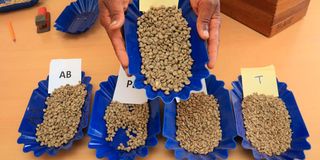Coffee from Kirinyaga’s Kii factory fetches record price

A coffee grader displays various grades of green coffee beans at Kirinyaga County Cooperative Union Laboratory on February 26, 2019. A consignment of coffee from the tiny Kii processing factory in Kirinyaga county has fetched the highest price in five years amid a scramble by buyers and roasters for high-quality beans.
What you need to know:
- A 50-kilogramme bag of AA-grade coffee from the factory under Rungeto Farmers’ Cooperative Society fetched $686 (Sh85,778.08) or Sh1,715.56 a kilogramme during the Tuesday auction at the Nairobi Coffee Exchange.
- This was the highest earnings since 2017.
- Buyers took up 17 bags of the speciality coffee netting growers from Kii some Sh1,458,227.36 from the single sale.
A consignment of coffee from the tiny Kii processing factory in Kirinyaga county has fetched the highest price in five years amid a scramble by buyers and roasters for high-quality beans.
A 50-kilogramme bag of AA-grade coffee from the factory under Rungeto Farmers’ Cooperative Society fetched $686 (Sh85,778.08) or Sh1,715.56 a kilogramme during the Tuesday auction at the Nairobi Coffee Exchange (NCE) the highest earnings since 2017.
Buyers took up 17 bags of the speciality coffee netting growers from Kii some Sh1,458,227.36 from the single sale.
“The performance was driven by the high quality of the beans that were offered,” Mr Daniel Mbithi chief executive officer of the NCE told the Nation.
Kii Factory is one of three owned and operated by Rungeto and is nestled near River Kii at the foot of Mt Kenya.
Records at the NCE show that the highest auction price ever netted was $751 (Sh93,862.23) per 50-kilogramme bag for a consignment sourced at a processing factory in Nyeri County in February 2017.
Kenya’s coffee is much sought after by roasters and blenders, and the country sells its produce to the world market. International prices are used as a benchmark for the local price at the NCE.
Statistics released by Co-operatives and MSMEs Cabinet Secretary Simon Chelugui in December last year showed that Kenya’s coffee production volumes rose 50.24 per cent during the crop year 2021/2022 to hit 51,843 tonnes compared to 34,505 tonnes recorded a year earlier, buoyed by the provision of subsidised fertiliser and access to affordable farm inputs.
Coffee reforms
The coffee sector, however, is still begging for a rebirth as more farmers dumped the crop for better rewarding ventures such as real estate and avocado production.
The State is currently battling to curb the slump amid concerns that the once-thriving coffee sub-sector had lost its appeal with production declining from 130,000 tonnes to an average of 40,000.
A task force appointed to address woes in the coffee sector has recommended a raft of reforms including the creation of a coffee value chain that substantially increases farmers’ incomes and provides financial support for production and training.
The team also recommended debt waiver, legal reforms, a Sh4 billion subsidy scheme to finance, among others, the provision of affordable fertiliser, the establishment of a coffee cherry advance payment scheme, modernisation of the NCE, and the marketing of Kenyan coffee.
Other proposals were for the government to abolish multiple levies that sliced farmers’ earnings but the implementation of these far-reaching proposals appears to have hit a brick wall.





